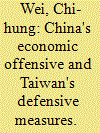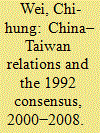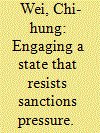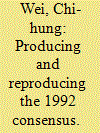|
|
|
Sort Order |
|
|
|
Items / Page
|
|
|
|
|
|
|
| Srl | Item |
| 1 |
ID:
124644


|
|
|
|
|
| Publication |
2013.
|
| Summary/Abstract |
This article explains how Taiwan's Democratic Progressive Party (DPP) administration was able to restrict cross-Strait fruit trade and resist China's "fruit offensive" in a democratic setting. During 2004-2005, China implemented various preferential policies for the importation of Taiwanese fruit and wooed Taiwanese farmers in the rural south, where political support for the DPP was concentrated. However, trade statistics show that cross-Strait fruit trade only increased slightly, making up just 4 or 5 per cent of Taiwan's total fruit exports during 2005-2008. I argue that focusing solely on regime type ignores the formal and informal policy instruments a democratic state can wield to manage its commercial ties with, and resist economic offensives from, other states. Cross-Strait fruit trade was limited because the DPP used legal as well as corporatist informal policy instruments to resist China's fruit offensive. I conclude that state-society institutional relations explain cross-Strait economic relations and economic statecraft better than regime type alone.
|
|
|
|
|
|
|
|
|
|
|
|
|
|
|
|
| 2 |
ID:
146166


|
|
|
|
|
| Summary/Abstract |
After mid-2000, Beijing inclusively redefined ‘one China’ as ‘both the mainland and Taiwan belonged to one China’. It also advocated the ‘peaceful development’ of China–Taiwan relations. Why did China moderate its Taiwan policy? I argue that the ‘1992 consensus’—a term invented and promoted by pan-Kuomintang (KMT) actors to describe the spirit of cross-Strait détente during 1992–1995—constituted China's policy moderation. Pan-KMT actors persuaded Beijing that its coercive approaches had alienated the Taiwanese people and that a conciliatory approach might win their hearts and minds. Accepted by Beijing, the 1992 consensus constructed China's Taiwan policy after 2000. Although Beijing has somewhat deemphasized the 1992 consensus since 2012, the term has established a legacy of appropriateness that Beijing is unlikely to undo in the short-to-medium term. In comparison with the Taiwanese case, no Hong Kong actors have played a role in persuading Beijing to keep its ‘one country, two systems’ promise.
|
|
|
|
|
|
|
|
|
|
|
|
|
|
|
|
| 3 |
ID:
141197


|
|
|
|
|
| Summary/Abstract |
Why did President Bill Clinton, while having linked human rights to China’s most-favoured-nation (MFN) status in 1993, delink the two issues in 1994, despite the fact that China had not improved its human rights record? This article explains Clinton’s linkage-delinkage policy reversal in terms of ‘strategic co-constitution’. After Tiananmen, Washington was concerned about China’s human rights abuses, arms proliferation and unfair trade practices. During 1992−3, Clinton initiated a ‘strategic social construction’ process that translated human rights into the linkage policy. Clinton stressed that a humane, democratic China would neither proliferate weapons nor engage in unfair trade practices. In 1994, however, a pro-MFN coalition persuaded Clinton that open trade could better advance US security, economic and human rights interests in China. Framing their rhetoric in ways that resonated with the exiting US concerns over China, pro-MFN actors led a strategic social construction process that redefined Clinton’s China policy toward engagement.
|
|
|
|
|
|
|
|
|
|
|
|
|
|
|
|
| 4 |
ID:
137402


|
|
|
|
|
| Summary/Abstract |
In the study of China-Taiwan relations, scholars view the so-called “1992 consensus” as essential to economic ties across the Taiwan Strait. However, such an argument overlooks the fact that the 1992 consensus was initially coined as a political formula concerning what “one China” meant. It was not until after 2008 that an economic logic was attached in a sociolinguistic way to the 1992 consensus by proponents of the 1992 consensus. Specifically, “1992ers” argued that China might sever cross-Strait economic ties should Taiwan reject the 1992 consensus. I thus argue that scholarly understandings about cross-Strait politics and/or economics are not unaffected by 1992ers’ interpretations. When 1992ers (re)interpret the 1992 consensus in economic terms, their discursive practices may change the intersubjective understandings about the cross-Strait political economy.
|
|
|
|
|
|
|
|
|
|
|
|
|
|
|
|
|
|
|
|
|